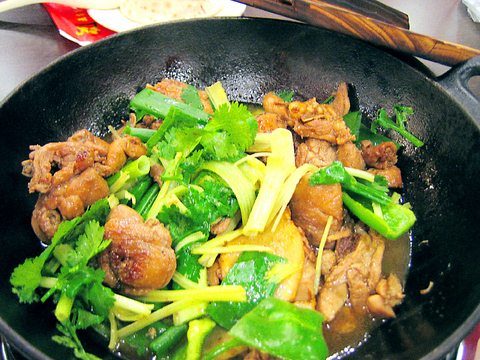You Ji Chufang (
"We chose the name because it was catchy, not because it has any special meaning," said one of You Ji Chufang's owners Lee Che-ming (
You ji sounds like the Chinese for "organic" and literally means "has chicken," but the restaurant's menu is built around neither organic food nor chicken (though the most popular dish is indeed a chicken dish). You Ji Chufang specializes in Cantonese cuisine -- the kind you don't find much in Taipei.

PHOTO: MERDITH DODGE, TAIPEI TIMES
Lee, whose day job is managing the sales department at a local newspaper, took a trip with two other investors and some chefs to Guangdong in search of cuisine that would be a hit back home. What they came up with was a menu of about 10 dishes. The number-one seller is the hua diao chicken (
Placed on a burner at the center of the table, the chicken continued to stew as I ate it. Steeped in the hua diao sauce with tomatos and green peppers, the chicken is juicy and fragrant.
Also juicy are the garlic squid rolls (
The most interesting and surprisingly good dish was pi pi cuo (
This place is open into the wee hours, perfect for a group of four to eight people famished from pub-hopping. If the food isn't spicy enough, you can always clear your palate with the restaurant's even spicier Kinmen sorghum wine.

On April 26, The Lancet published a letter from two doctors at Taichung-based China Medical University Hospital (CMUH) warning that “Taiwan’s Health Care System is on the Brink of Collapse.” The authors said that “Years of policy inaction and mismanagement of resources have led to the National Health Insurance system operating under unsustainable conditions.” The pushback was immediate. Errors in the paper were quickly identified and publicized, to discredit the authors (the hospital apologized). CNA reported that CMUH said the letter described Taiwan in 2021 as having 62 nurses per 10,000 people, when the correct number was 78 nurses per 10,000

As we live longer, our risk of cognitive impairment is increasing. How can we delay the onset of symptoms? Do we have to give up every indulgence or can small changes make a difference? We asked neurologists for tips on how to keep our brains healthy for life. TAKE CARE OF YOUR HEALTH “All of the sensible things that apply to bodily health apply to brain health,” says Suzanne O’Sullivan, a consultant in neurology at the National Hospital for Neurology and Neurosurgery in London, and the author of The Age of Diagnosis. “When you’re 20, you can get away with absolute

May 5 to May 11 What started out as friction between Taiwanese students at Taichung First High School and a Japanese head cook escalated dramatically over the first two weeks of May 1927. It began on April 30 when the cook’s wife knew that lotus starch used in that night’s dinner had rat feces in it, but failed to inform staff until the meal was already prepared. The students believed that her silence was intentional, and filed a complaint. The school’s Japanese administrators sided with the cook’s family, dismissing the students as troublemakers and clamping down on their freedoms — with

As Donald Trump’s executive order in March led to the shuttering of Voice of America (VOA) — the global broadcaster whose roots date back to the fight against Nazi propaganda — he quickly attracted support from figures not used to aligning themselves with any US administration. Trump had ordered the US Agency for Global Media, the federal agency that funds VOA and other groups promoting independent journalism overseas, to be “eliminated to the maximum extent consistent with applicable law.” The decision suddenly halted programming in 49 languages to more than 425 million people. In Moscow, Margarita Simonyan, the hardline editor-in-chief of the